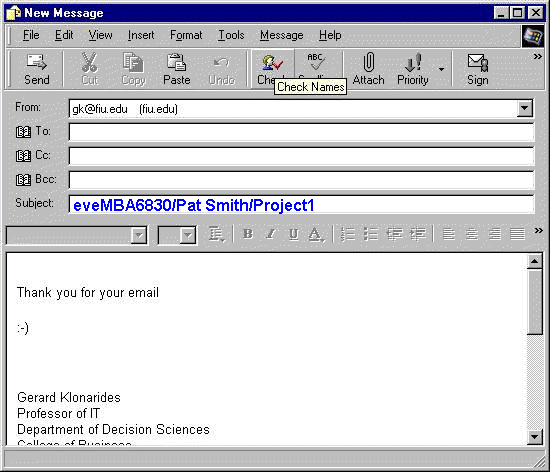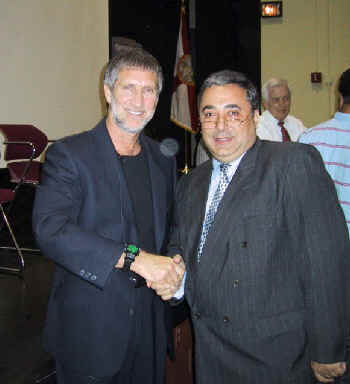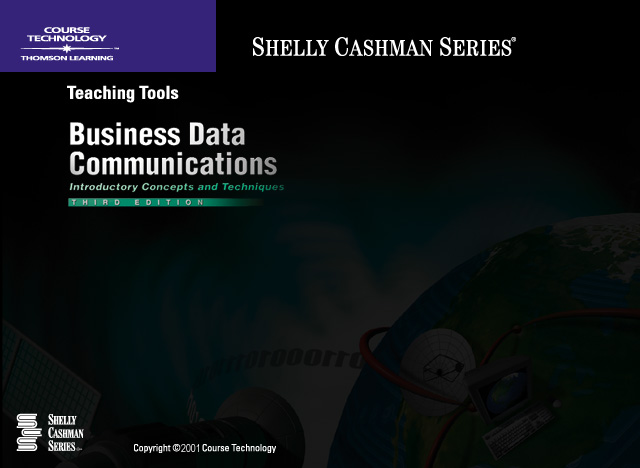 Business Data Communications is all about
how to communicate in the digital world. We start off with how an email
travels down the telephone lines through a modem, and discuss both digital
and analog communications. We discuss protocols of communication for LANS,
WANs, and of course the Internet. Business Data Communications is all about
how to communicate in the digital world. We start off with how an email
travels down the telephone lines through a modem, and discuss both digital
and analog communications. We discuss protocols of communication for LANS,
WANs, and of course the Internet.
We will discuss security, ethics, and doing business globally.
Finally, we will discuss the first things an
MIS Manager should do when in the corporate world.
IT and the MIS is changing at a rapid pace
leaving a lot of companies straggling to keep up. This course is
not about how to be a techie. This course is about MANAGING
Information systems.
This course is the foundation for many MIS
courses.
Welcome to Business Data Communications
|
|
Prerequisite:
Must have already completed and received a passing grade of C or more
one of the following:
CGS 3300
and
ISM 4220 Business Data Communications
- You are expected to have the basic
skills in handling IBM-PC compatible computer running Windows 3.1,
Windows 95/98 or Windows 2000/Me/XP, including file handling
operations using file manager/Windows Explorer/ Netscape, basic text
editing using Window's notepad or MS Word.
- The full time use of a PC desktop or
laptop
- An email address which you check
daily.
- You will need two burn two CDs, one for each
project. If you do not have a CD burner, these are available are
Office Depot, Kinko's and various other places.
- The time and
ability to go on a field trip either in a group or by oneself.
- The time and ability to work on two
projects in a group or by oneself.
- The time and ability to check email
daily
- The time and ability to check the
Professor's web daily
Both 8 and 9 are imperative to communicating with the class
|
|
ISM 4220 Business Data Communications is all about
how to communicate in the digital world. We start off with how an email
travels down the telephone lines through a modem, and discuss both digital
and analog communications. We discuss protocols of communication for LANS,
WANs, and of course the Internet.
We will discuss security, ethics, and doing
business globally.
Finally, we will discuss the first things an
MIS Manager should do when in the corporate world.
IT and the MIS is changing at a rapid pace
leaving a lot of companies straggling to keep up. This course is
not about how to be a techie. This course is about MANAGING
Information systems.
This course is the foundation for many MIS
courses.
|
|
The best way
to communicate with me is by email.
Emails
- Subject line: When you send an email, make sure that the
subject line of your email starts as per Example
1 that
follows:
- Carbon copies: If you would like to make sure that you have
sent important email correctly, send a "cc" to yourself. Then if you
do not get a copy back - you know there is something wrong.
- Requesting a receipt: If you want a receipt for
assignments, projects and important emails, activate your receipt
request in your email program. This is a simple procedure and will
cut down a lot of emails asking me -did you receive my email
Professor? If you are using Outlook Express for example, Click
on Tools, Options, Receipts and choose request receipt.
- The time and date of your emails must be accurate
especially when there are deadlines. Your email starts off with your
computer's time and date. If this is incorrect by an hour, then your
email will arrive by an hour off. Therefore make sure that the
computer your are using, the lab computer, the office computer, your
friend's computer and your laptop and desktop have an accurate time
and date. Assignments that arrive late receive only a fraction of the grade
and assignments that do not arrive at all, receive an incomplete
until they arrive.
- If the time or date is incorrect then this is what you do:
Move your mouse to the bottom right hand corner of your monitor.
Slide it over the time. This will give you the time and date. If it
is not accurate, right click on it. Adjust date and time. Make sure
Date, Time and Time Zone are correct.
- Anti Virus: A good antiviral program is necessary. Protect
your computer. If your email or attachment contains a virus, it will
not be opened and will be deleted immediately.
- All attachments being sent must be formats that are supported. An
example: MS Office, MS Word, MS Excel, MS Access, MS PowerPoint,
Notepad, WordPad, .jpeg, .mpeg, .wav, .tiff, Corel Draw, .swf, .htm,
FrontPage.
- I do not support
WordPerfect
at this present moment.
- Spell check: Please activate and use it. Typos and
incorrect spelling does not make a good impression and sometimes can
confuse the reader.
- Large files and attachments: Some email programs have
a limit on how large a file you can send through them. For example,
HOTMAIL has a limit of 1MB. If your attachment or file is larger than
1 MB, your file will not be sent. You can either compress your files with a
zip or use another email service e.g. Yahoo.com
- Subject line: [ v e
r y i m p o r t a n t ]
CGS
3300
CGS3300/Pat Smith/Assignment 1
ISM
4220 Business Data Communications
ISM4220/Your name
/Subject...............for example
ISM4220/Pat Smith/Assignment 1
ISM
4990 Network Security
ISM4990/Your name
/Subject...............for example
ISM4990/Pat Smith/Assignment 1
International
MBA
IMBA6830/Your Name/Subject
evening
MBA6830
eveMBA6830/Your Name /Subject
Graduate
Management Program MAN 6830
GMP 6830/Your name/Subject
executive
MBA JAMAICA
JAMMAN6830/Your Name/Subject
If you are not attending a class now
your subject line should start off with:
YOUR NAME/Subject
Example
1

Telephone
calls
Please
email me at gk at fiu. edu .
Do not call my extension at the office to leave a message. The staff in
the CBA
are there to support the faculty in their duties.
Faxes
Do not send faxes.
Dropping in: It is my pleasure to see you. However,
"dropping in" does not necessarily
mean that there will be enough time to see you or deal with a particular
problem. So, if your business is important make sure that you have emailed
me or spoken
to me first.
|
 Business Data Communications is all about
how to communicate in the digital world. We start off with how an email
travels down the telephone lines through a modem, and discuss both digital
and analog communications. We discuss protocols of communication for LANS,
WANs, and of course the Internet.
Business Data Communications is all about
how to communicate in the digital world. We start off with how an email
travels down the telephone lines through a modem, and discuss both digital
and analog communications. We discuss protocols of communication for LANS,
WANs, and of course the Internet.

